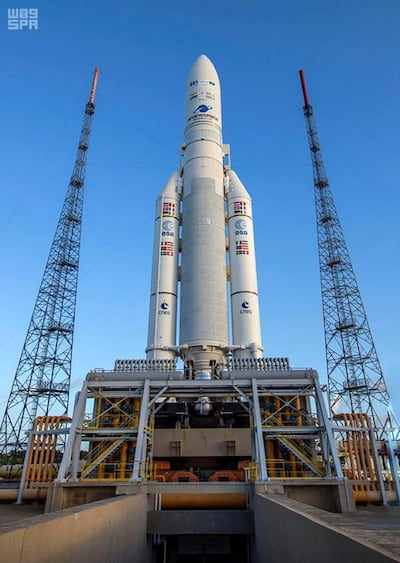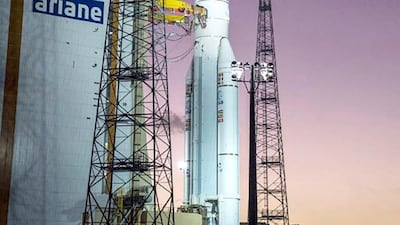Saudi Arabia’s latest communication satellite developed by the kingdom's scientists and engineers has been launched by the European aerospace company ArianeGroup.
The rocket carried the Saudi Geostationary Satellite 1 (SGS-1) into orbit on Tuesday night from the Guiana Space Centre in French Guiana, South America.
“It provides secure satellite communications, stronger internet and television connectivity, on the KA band for the government of Saudi Arabia, it has the coverage of Middle East, North Africa and Europe for the next 15 years,” Badr Al Suwaidan, the satellite’s programme director said.
“It’s a sign of a new era,” he added.
The operation was carried out by Arianespace using the Ariane 5 rocket, which also carried an Indian satellite into orbit.
Crown Prince Mohammed bin Salman oversaw the development in 2018 and placed a signed letter, headed "above the clouds" to be placed inside the rocket before take off.
A team from the King Abdulaziz City for Science and Technology developed the satellite in collaboration with American aerospace company Lockheed Martin.
KACST is a government institution that supports and enhances the kingdom's satellite research. It has launched 15 satellites in to low-earth orbit, Mr Al Suwaidan said.
Previous launches included remote-sensing satellites designed to provide high-resolution images of the planet’s surface.
The kingdom has also collaborated with China in December to launch a satellite to land on the far side of the Moon.

Ground stations in the kingdom will operate and control the satellite. It will provide multiple services including broadband and secure communications to disaster areas.
“The satellite aims to improve local capabilities and to create more job opportunities in the space industry,” Saudi Press Agency said.
The satellite will serve the Saudi government and Greek-Cypriot Hellas-sat, a subsidiary of the Riyadh-based Arabsat.
It will also support the infrastructure of the kingdom's telecommunications sector, according to the Saudi Press Agency.
Saudi Minister of Energy Khalid Al Falih said the satellite aims to look at localising strategic technologies and to provide Saudi youth with the opportunity to work with the latest technologies in the fields of development and manufacturing.
The project is part of the kingdom’s Saudi Vision 2030 that aims to diversify the economy away from oil.


